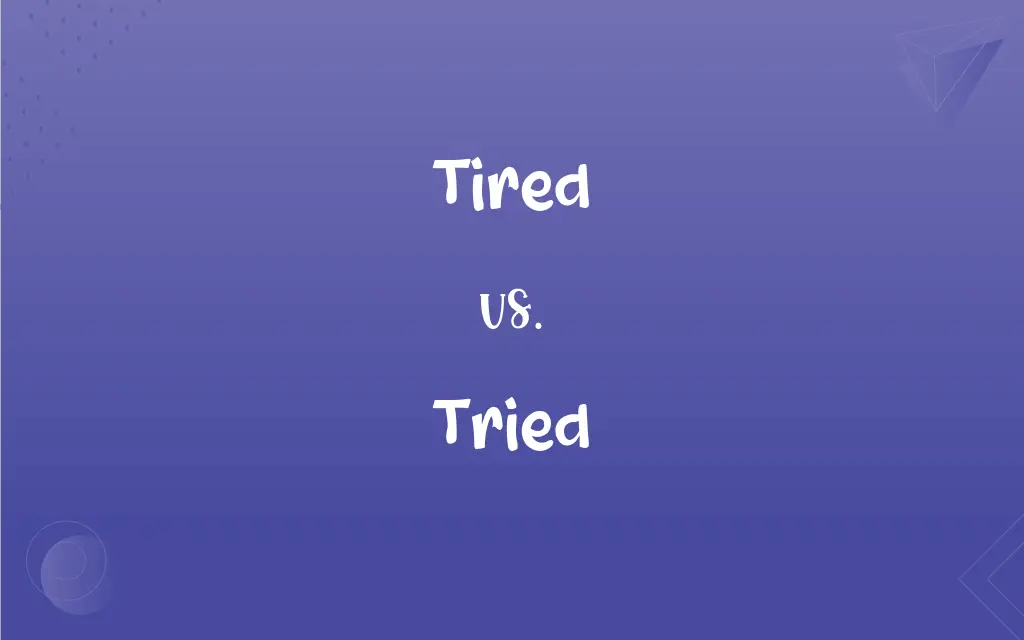Tired vs. Tried: What's the Difference?
Edited by Aimie Carlson || By Janet White || Published on January 8, 2024
Tired is feeling a need for rest or sleep. Tried is past tense of 'try', meaning to attempt or endeavor.

Key Differences
Tired refers to the state of physical or mental exhaustion, where one feels a need for rest or sleep. It's an adjective describing a condition. Tried, on the other hand, is the past tense of the verb 'try', implying an attempt or effort to do something.
Tired can also imply being weary or bored of something, indicating a lack of interest. It's used to describe someone's state of energy. Tried suggests that an action was taken, regardless of the outcome, indicating an effort was made.
In the context of feelings, tired can describe being emotionally drained or fatigued. It's often associated with a decline in performance or mood. Tried denotes that a person has put in an effort or action towards a particular task or challenge.
Tired is an adjective that can modify nouns, as in "tired muscles" or "tired eyes." It describes a characteristic. Tried is used in the context of actions and experiences, such as in "tried to call" or "tried a new recipe."
Tired can be used metaphorically to suggest that something is worn out or obsolete. Tried is also used in legal contexts, as in "tried in court," which means to be subjected to a trial.
ADVERTISEMENT
Comparison Chart
Part of Speech
Adjective
Verb (Past Tense)
Usage
Describes exhaustion or need for rest
Indicates an attempt or effort made
Emotional Context
Can imply boredom or emotional drain
Shows determination or action taken
Usage in Sentences
Modifies nouns (tired eyes)
Follows subjects (He tried calling)
Figurative Meaning
Indicates obsolescence or weariness
Used in legal terms (tried in court)
ADVERTISEMENT
Tired and Tried Definitions
Tired
Needing sleep or rest.
The baby was tired and fell asleep quickly.
Tried
Made an effort to achieve something.
She tried baking a cake for the first time.
Tired
Feeling worn out physically or mentally.
After the marathon, she felt extremely tired.
Tried
Experimented with or examined.
He tried the solution to see if it would work.
Tired
Feeling a lack of energy or enthusiasm.
He was tired of the same daily routine.
Tried
Undergone or faced a particular situation.
They had tried times during the project.
Tired
Depleted of energy or vitality.
The long meeting left her feeling tired.
Tried
Strived to achieve a goal.
They tried to reach the summit despite the odds.
Tired
Feeling uninterested due to repetition or lack of novelty.
She grew tired of the same old television shows.
Tried
Subjected to a legal trial.
The defendant was tried for fraud.
Tired
Exhausted of strength or energy; fatigued.
Tried
Past tense and past participle of try.
Tired
Impatient; bored
Tired of the same old sandwiches.
Tried
Thoroughly tested and proved to be good or trustworthy.
Tried
Made to undergo trials or distress. Often used in combination
A much-tried teacher.
Tried
Tested, hence, proven to be firm or reliable.
Tried
(law) Put on trial, taken before a lawcourt.
Tried
Simple past tense and past participle of try
Tried
Tested and proved useful or correct;
A tested method
Tried
Tested and proved to be reliable
FAQs
Is "tired" only used to describe physical exhaustion?
No, "tired" can describe physical, mental, or emotional exhaustion.
What does "tried and true" mean?
It means something that has been tested and proven to be reliable.
Can "tired" be used figuratively?
Yes, it can indicate something is worn out or obsolete.
Can "tried" be used in present tense?
No, "tried" is the past tense of "try". The present tense is "try".
Does "tried" imply success?
No, "tried" only indicates an attempt, not the outcome.
Is "tired" appropriate for describing objects?
Yes, in a metaphorical sense, like "tired furniture".
Can "tried" be used in a legal context?
Yes, it can refer to being subjected to a trial in court.
Is "feeling tired" always negative?
Not necessarily; it can be a natural response to activity or work.
Does "tried" always refer to a past action?
Yes, it's the past tense form of "try".
Is it correct to say "I am very tired with work"?
Yes, it implies you're exhausted or fed up with work.
Can animals be described as "tired"?
Yes, animals can also exhibit signs of tiredness.
Can "tired" be a permanent state?
No, it's typically a temporary condition.
Can "tired" relate to mental tasks?
Yes, one can be tired from mental exertion.
Is "tried" related to "trial"?
Yes, both words share a root in the concept of testing or attempting.
What does "well-tried" mean?
It means something has been tested and proven effective.
Is "tried" used in both formal and informal contexts?
Yes, it's appropriate in both settings.
Can "tried" be used with objects?
Yes, in the context of testing or experimenting with them.
Does "tired" always require physical activity first?
No, it can result from emotional or mental strain too.
What's the noun form of "tried"?
There's no direct noun form, but "trial" is closely related.
Can one be tired without realizing it?
Yes, sometimes people don't recognize their own fatigue.
About Author
Written by
Janet WhiteJanet White has been an esteemed writer and blogger for Difference Wiki. Holding a Master's degree in Science and Medical Journalism from the prestigious Boston University, she has consistently demonstrated her expertise and passion for her field. When she's not immersed in her work, Janet relishes her time exercising, delving into a good book, and cherishing moments with friends and family.
Edited by
Aimie CarlsonAimie Carlson, holding a master's degree in English literature, is a fervent English language enthusiast. She lends her writing talents to Difference Wiki, a prominent website that specializes in comparisons, offering readers insightful analyses that both captivate and inform.






































































